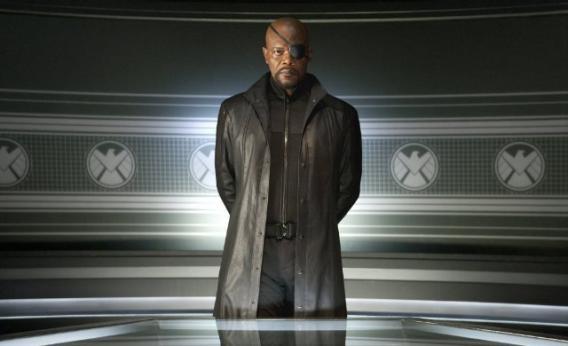In The Avengers, opening in the U.S. tomorrow, Samuel L. Jackson plays Nick Fury, a military commander who assembles the Avengers to save the world. Today, he took to Twitter to assemble Avengers fans against their own deadly nemesis, New York Times film critic A.O. Scott. Unhappy with Scott’s mixed review of the upcoming film, Jackson suggested they find him a new calling:
There are, of course, many reasons that Avengers fans (and Samuel L. Jackson) should hold off here, rather than unleashing their no doubt awesome powers. One in particular stands out: The fans haven’t seen the movie yet. Indeed, the pre-release outrage over Scott’s not-entirely-positive-and-maybe-even-lukewarm review only serves to prove one of Scott’s principal arguments about the film. Near the end of his review, Scott questions how rebellious The Avengers’ supposedly maverick heroes really are, and suggests that the movie has more in common with its supposed villain, Loki, who offers “freedom” in the form of complete submission:
In Germany he compels a crowd to kneel before him in mute, terrified awe, and The Avengers, which recently opened there to huge box office returns, expects a similarly submissive audience here at home. The price of entertainment is obedience.
Perhaps Jackson didn’t read the whole review. But in calling on his followers to take on Scott’s “jaundiced ass,” he, too, is evoking the supposedly maverick Nick Fury in order to demand obedience to his movie.
Those who follow his lead exemplify one of the biggest problems with fanboy culture: The tendency to reach conclusions about a movie before anyone, save perhaps a few Hollywood insiders, has seen it. Many moviegoers don’t trust critics, either because of differences in taste or because they “don’t like to be told what to think.” To them the critics are the despots. But when opening night comes around, and you’re deciding whether to spend your 12 (or 16, or 20) bucks, what’s the alternative? You can trust the marketing, or you can trust people who have actually seen the movie.
Not that there’s anything wrong getting excited about a movie, of course. The weeks and months—or, these days, nearly a year—of anticipation can be as much fun as the movie itself. When Star Wars Episode 1 arrived in theaters, I was first in line for tickets at my local theater, having skipped school with my mom, and was interviewed by the local news while wearing a Yoda mask. And I went to see it five more times in the theater. On each of those repeat visits, I was hoping that this time the movie’s no doubt obvious greatness would reveal itself to me. Eventually, I realized that the critics had been right, that I should have listened more to those who weren’t already in the pocket of the studio, and a little less to Mace Windu, before finally reaching my own conclusions.
Making up your own mind is ultimately what this is all about. In that Avengers scene in Germany that Scott mentions, when Loki demands kowtowing from the crowd, there’s one man that stands up and says that he’s wrong, that the tyrants are all the same. Then Loki turns his spear on him. Now, calling for a man’s job on Twitter may not be quite as harsh, but the impulse feels sadly similar. Where’s Nick Fury when you need him?
